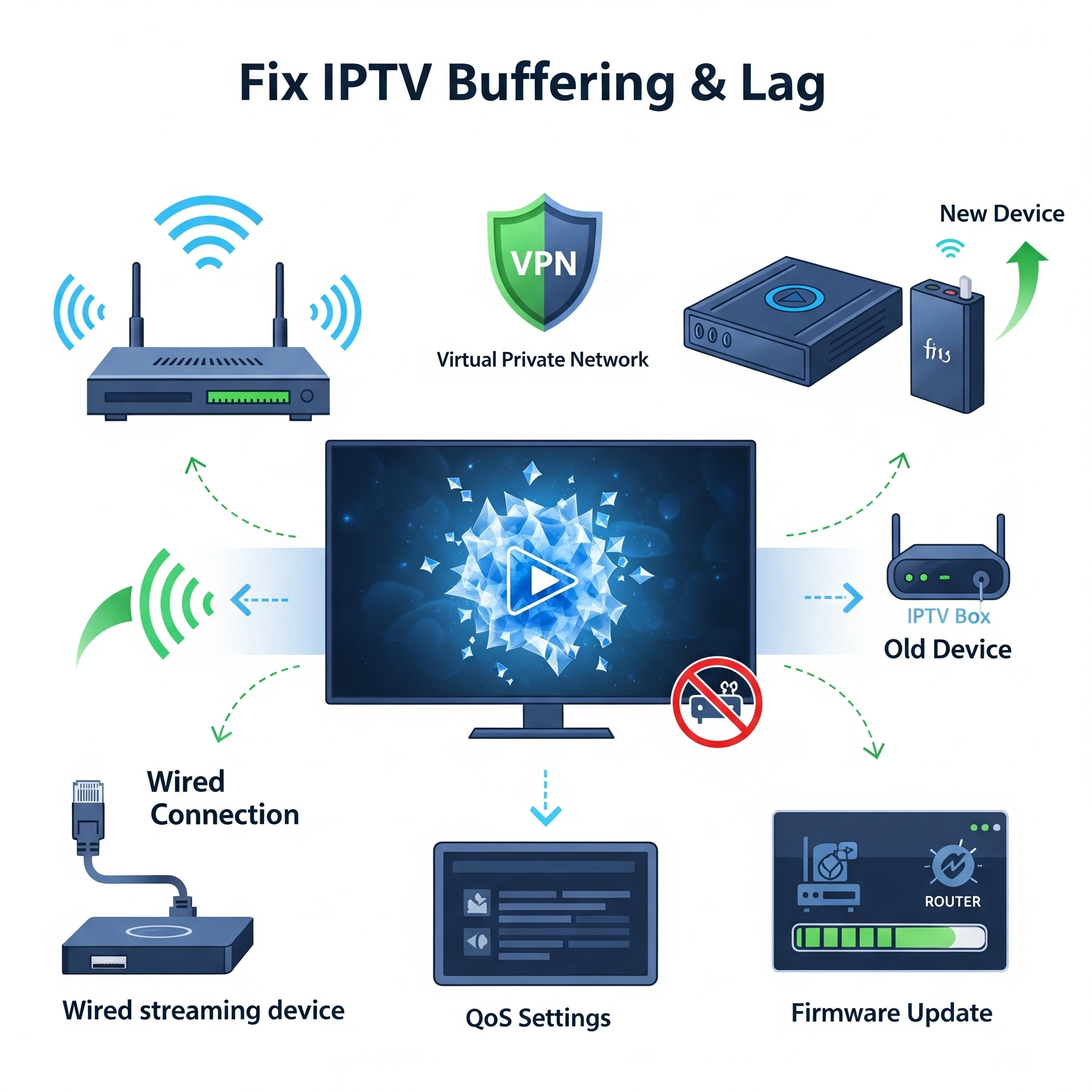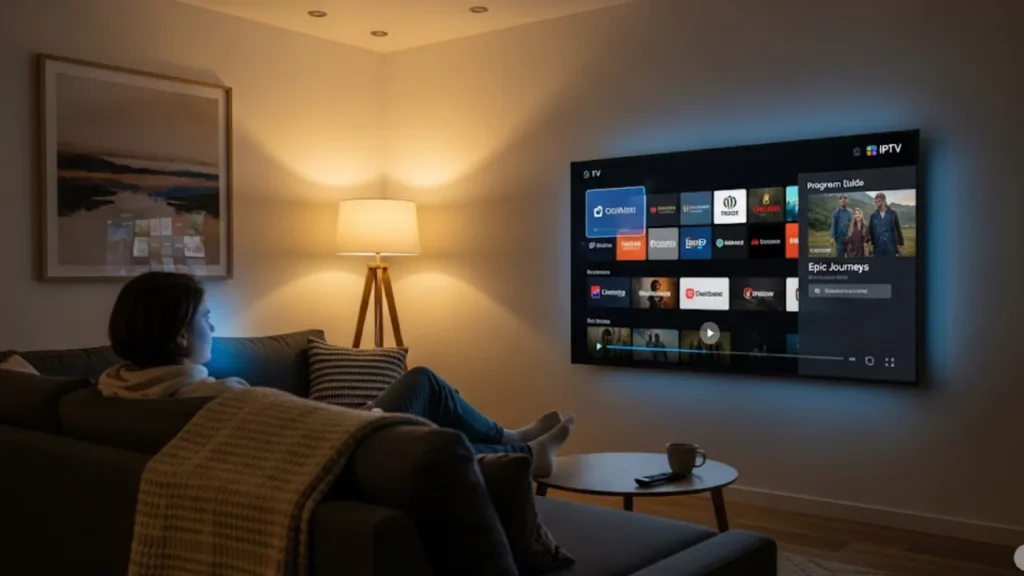Tired of endless buffering during your favourite show? Frustrated when live sports freeze at the most exciting moments? You’re not alone. Poor IPTV performance can be frustrating. The coolest news is that most streaming problems have smooth fixes.
This guide shows you how to stop IPTV buffering, cut latency, and boost your streaming. Enjoy smooth, high-quality viewing!
IPTV buffering and lag often stem from slow internet speeds, weak devices, or poor network setups. To fix this, ensure fast internet, use wired Ethernet instead of Wi-Fi, upgrade to a capable streaming device, and choose a reliable IPTV provider. Advanced tweaks like VPNs, QoS settings, and updated firmware can also cut latency. With these steps, you can enjoy smooth, high-quality streaming without interruptions.
What Causes IPTV Performance Issues?
IPTV makes use of your net to send live tv and VOD libraries on your streaming tool. Every frame moves through your home network, unlike traditional cable. This setup is the spine of your streaming enjoy.
Latency takes place while data takes too lengthy to journey from IPTV servers to your device. This delay creates the frustrating pauses and pixelated video that interrupt your viewing. Delays come from network congestion, low internet speed, and devices that work poorly.
Smart TVs, Android TV boxes, and streaming devices like Fire TV each manage IPTV in their own ways. Older devices have trouble with 4K content and HD video. Newer models process these smoothly, thanks to better processors. Your streaming service performance depends heavily on this hardware capability.
Knowing these parts helps you see where your setup can improve.
How Can You Optimize Your Network?

Your home network is like a highway for video streaming. It carries data between your devices and the internet. A congested network, bad setup, or old hardware can cause bottlenecks. These issues slow down data transfer. Bottlenecks cause IPTV buffering and interruptions. This lowers streaming quality. It makes it hard to enjoy your favourite shows or movies smoothly. Ensuring a fast, optimized network is essential for a seamless streaming experience.
Internet Speed Requirements
- Standard definition requires 5 Mbps minimum
- HD video needs 10-15 Mbps per stream
- 4K quality demands 25+ Mbps consistently
- Multiple devices streaming simultaneously multiply these requirements
Router Optimisation Steps
- Enable Quality of Service (QoS) – Prioritise streaming traffic over other internet activity
- Update firmware regularly – Newer versions often include performance improvements for video streaming
Place your router in the centre of your home. Keep it away from things that cause interference, such as microwaves or baby monitors. If you have weak Wi-Fi in some rooms, try a Wi-Fi extender. It can boost the signal where you stream the most.
Ethernet cables provide the most stable connection for serious streaming. Wi-Fi 6 and Wi-Fi 5 provide solid wireless performance. However, wired connections remove wireless interference and packet loss. This makes your streaming experience smoother.
What Device Upgrades Make the Difference?
Your streaming device translates IPTV signals into the content on your TV. It plays a critical function in ensuring clean and seamless streaming. if your device is underpowered or can’t technique well, it could gradual things down. This leads to buffering and lag that even fast internet can’t solve. Investing in a good streaming device is key. It enables you enjoy your IPTV revel in with out interruptions.
High-Performance Options
- Nvidia Shield – Premium Android TV experience with powerful processing
- Amazon Fire TV Stick 4K – Budget-pleasant choice helping 4K streaming
- Formuler Z11 Pro – Specialized IPTV device with advanced features
- Mi Box and similar Android TV boxes offer middle-ground performance
Device performance extends beyond hardware specs. Clearing your app cache regularly prevents memory issues that slow streaming. IPTV Smarters and similar IPTV apps have settings to boost streaming quality. They adjust based on your connection speed.
Some IPTV providers’ set-top boxes may not have enough power for smooth 4K content. If you keep buffering, even with fast internet, upgrade your streaming device. It usually helps right away.
Check out your local electronics store when shopping for devices. They often offer hands-on demos to help you pick the best option for your needs.
Why Do External Solutions Help Performance?
Sometimes the issue isn’t your home network but rather the path your data takes to reach you. ISP throttling and server congestion can impact even the best home setups.
VPNs can boost IPTV performance. They do this by routing your connection around crowded network paths. Choose providers with fast servers and a kill switch. This helps you keep connections steady. Some VPNs have obfuscated servers. These servers help avoid content blocks and keep streaming quality high.
Content Delivery Networks (CDNs) help IPTV providers distribute content more efficiently. Edge servers and segment caching improve streaming. They preserve famous content material closer to users, making it smoother. Multi-bitrate streaming changes the video quality based on your internet speed. This way, you won’t experience buffering when your speed decreases.
Smart DNS services let you access region-restricted content. They do this without slowing down your connection, unlike some VPNs. This technology works particularly well for streaming HD content from international sources.
Pro Tips for Consistent Performance
Check your network often. Use gear or apps to song speed. They can help spot latency spikes. Many modern routers have real-time analytics. These tools allow you to see patterns in network congestion during the day.
Advanced Optimization Techniques
- Use powerline adapters when Ethernet cables aren’t practical
- Configure digital LANs to separate streaming site visitors from different gadgets
- Enable MU-MIMO technology on compatible routers for better multi-device performance
- Consider DDoS protection if you experience frequent connection drops
Schedule automatic restarts for your router and streaming devices. This simple maintenance prevents memory buildup that can gradually degrade performance over time. Most quality routers include scheduling features for hands-free network optimization.
Keep firmware updated on all devices in your streaming setup. Manufacturers often launch updates aimed at enhancing streaming and supporting new IPTV technologies.
Final Thoughts: Achieving Smooth IPTV Streaming
Transforming your IPTV experience doesn’t require expensive equipment overhauls. Start with the basics. Make sure you have a good internet speed. Use wired connections if you can. Also, keep your devices updated. These fundamental steps resolve the most common streaming issues.
Remember that different IPTV providers offer varying levels of service quality. If you’ve optimized everything but still face problems, try testing other providers. They might have better server infrastructure or content delivery.
The investment in proper IPTV setup pays dividends in daily entertainment enjoyment. Smooth streaming makes your viewing more enjoyable. Whether it’s live sports, international channels, or VOD libraries, every moment is thrilling.
Frequently Asked Questions
- Which IPTV has the best performance?
The top IPTV services have reliable servers. They also offer fast load times, minimal buffering, and consistent uptime. Performance varies by region, but premium providers usually offer smoother streaming.
- Is there an IPTV that doesn’t buffer?
No IPTV is completely buffer-free. However, top providers with strong servers and good bandwidth management have minimal buffering. Using a stable internet connection also reduces issues.
- How can I make my IPTV stream faster?
You can make IPTV faster by:
- Upgrading your internet.
- Reducing the number of connected devices.
- Using wired Ethernet instead of Wi-Fi.
- Enabling a VPN if your ISP slows down streaming.
- Does it matter which IPTV app you use?
Yes. The app you use affects performance, user experience, and compatibility. Apps such as TiviMate and IPTV Smarters ensure smooth playback and dependable streaming.
- How do you optimize IPTV performance?
To optimize IPTV, follow these steps:
- Adjust buffering settings.
- Choose the right video resolution based on your internet speed.
- Use hardware acceleration.
- Clear the app cache regularly.


